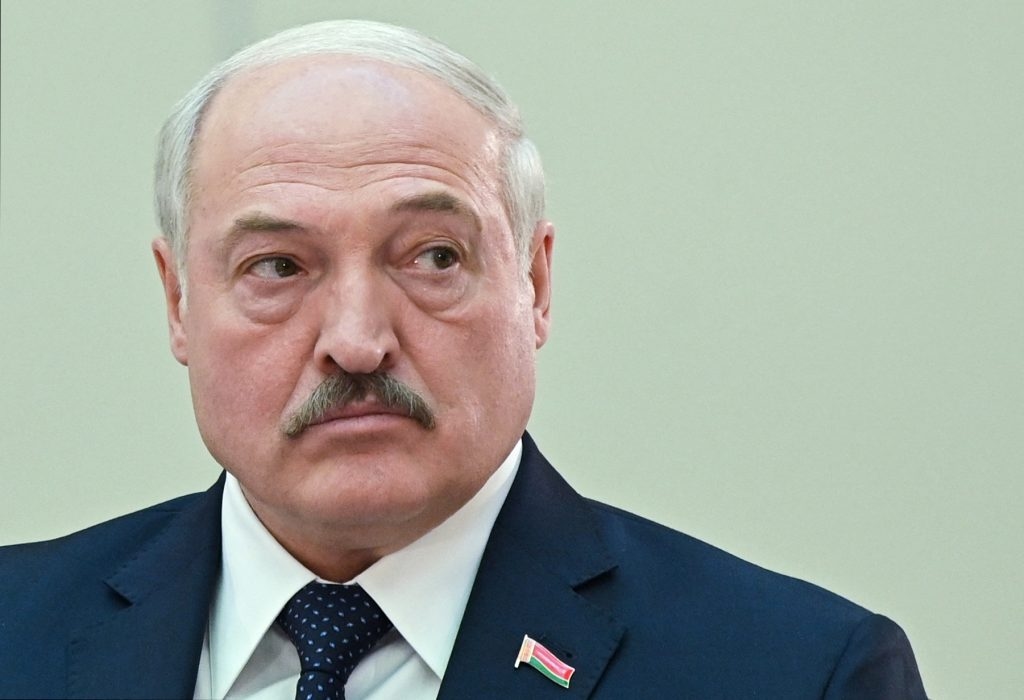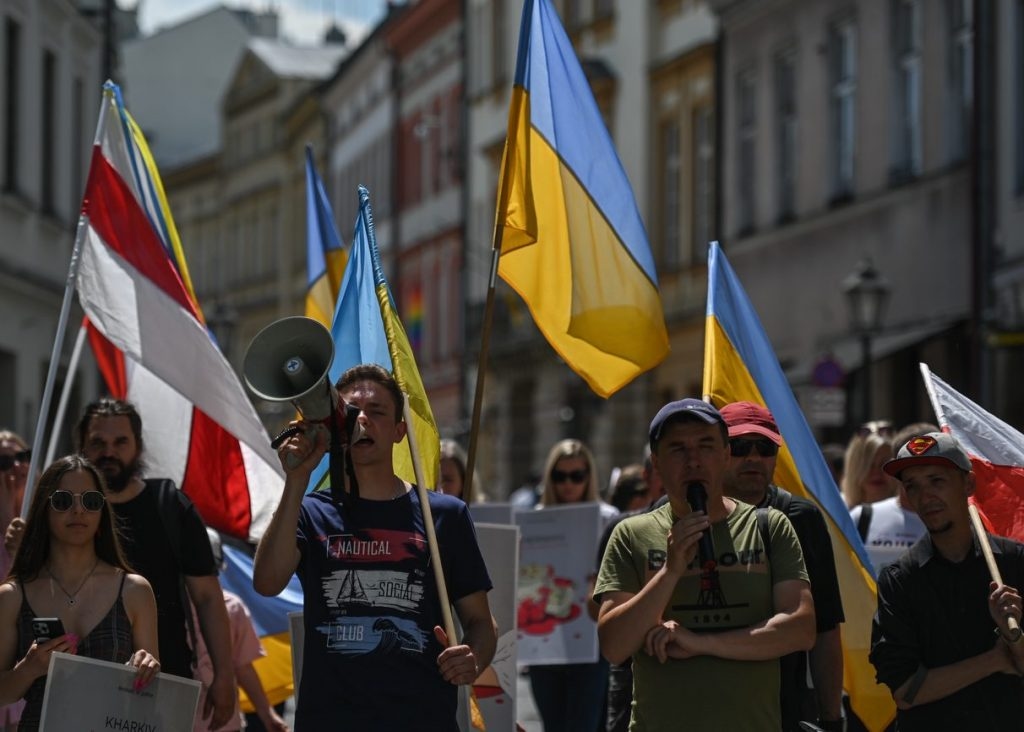As Belarus' regime sides with Putin, people try to help Ukraine win

The peaceful lives of Ukrainians were abruptly shattered by the incoming missiles that marked the beginning of Russia’s full-scale invasion on Feb. 24. Many of those missiles were fired from Belarus.
The regime under Belarusian dictator Alexander Lukashenko, held afloat by Russian President Vladimir Putin, has permitted Russian troops to enter and operate from Belarus, thereby dragging the country into Europe’s deadliest war since World War II.
According to Ukraine’s Armed Forces, over 1,000 rockets were fired at Ukraine within the first three months of Russia’s full-scale war, with nearly half of them launched from Belarus. Russian troops have also been permitted to receive medical treatment in the country and some have sent stolen goods from Ukraine back to Russia from Belarusian post offices.
At the same time, a substantial number of the country’s residents have attempted to support Ukraine.
Sviatlana Tsikhanouskaya, the leader of the Belarusian opposition who was exiled after running against Lukashenko in the country’s rigged 2020 presidential elections, publicly supported Ukraine and called on fellow Belarusians to create a national anti-war movement.
Activists within Belarus tried to disrupt domestic railway networks to obstruct the movement of Russian troops through the country and Belarusians living abroad have launched volunteer movements to assist Ukrainians in need.
An entire regiment consisting of Belarusian nationals is also currently fighting alongside Ukrainian forces against Russia.
In the struggle between freedom and authoritarianism, Belarusians find themselves on both sides of the fight.
Two worlds – one country
For 26 years, Lukashenko attempted to sell the Belarusian people the promise of stability and steady economic development in exchange for compliance with his autocratic rule. In 2020, these attempts ceased to work.
Belarus’ economic stagnation and Lukashenko’s mismanagement of the COVID-19 pandemic fueled widespread discontent, which came to a head as the country rolled into the 2020 presidential elections.
The elections, at most but a formality in Belarus, transformed into a heated campaign. Despite having banned all but one of his oppositional candidates, Tsikhanouskaya, Lukashenko looked set to lose his sixth presidential election.
Mass protests broke out within hours of Lukashenko declaring himself the winner. However, the upheaval died out as the country’s law enforcement detained and tortured dissidents.
Lukashenko’s regime imprisoned activists, volunteers, and independent journalists remaining in Belarus. Independent media outlets were shut down and opposition leader Tsikhanouskaya was exiled from the country.
Tsikhanouskaya’s husband, Sergey, was sentenced to 18 years in jail and her aide, Maria Kolesnikova, received an 11-year sentence.
The crackdown on civil society led to massive waves of emigration from Belarus.
As per Belarus’ official statistics portal, Belstat, 60,000 people left the country in 2020 alone. In 2021, 94,000 additional Belarusians (1% of the country’s population) moved abroad.
The political crisis that ensued after the 2020 elections set the stage for Belarus’ role in Russia’s ongoing war in Ukraine.
Lukashenko’s bargain
Russia wasted no time in coming to Lukashenko’s aid as the West imposed sanction after sanction on the country’s regime for election rigging and rampant human rights abuses.
Russia provided Belarus with a total of $3 billion in loans, continued to supply tariff-free oil and gas, and continued to serve as the main importer of Belarusian goods.
Belarus’ economy relied exclusively on Russia.

Belarusian political analyst Artyom Shraibman says the process of Lukashenko losing autonomy in his foreign policy was gradual.
In the beginning, Lukashenko managed to dodge substantial concessions to the Kremlin, which attempted to push Belarus into a dual Union State.
In its most blatant version, the Union State envisioned the integration of Russia and Belarus’ tax codes, a common currency issued in Moscow, and the confederation of both states.
The integration road map, consisting of 28 treaties, was signed in 2021.
While the treaties remained unaddressed by Lukashenko, offering up Belarusian territory as a site from which Russia might attack Ukraine appears to be a concession Lukashenko didn’t manage to sidestep.
“Lukashenko has been executing another person’s will by extending military drills and allowing Russian troops to stay in Belarus,” says Shraibman. “And I’m not convinced that Lukashenko was warned about the invasion long before its beginning.”
However, in fear of a domestic uprising, Lukashenko was able to stop short of fully conceding to Putin, in that Belarusian forces have not crossed the border into Ukraine.
According to Shraibman, Lukashenko understands how unpopular a direct war against Ukraine would be among the Belarusian people.
“I would expect a high rate of desertions, refusals to fight, and protests might actually erupt in the country," Shraibman says.
Domestic polls by the Belarusian Analytics Workshop and Chatham House reveal that 97% of Belarusians opposed officially joining the war.
Fighting for Ukraine and Belarus
While Lukashenko remains reluctant to send Belarusians to fight Ukraine on Russia’s behalf, many Belarusians have joined Kyiv in its fight against Moscow.
A battalion composed of Belarusian nationals, named after a 19-century national hero Kastus Kalinouski, was created in March to fight alongside Ukrainian troops.
On May 20, the battalion announced that it had enough members to constitute a full-fledged regiment. While the exact numbers have not been disclosed, having two battalions suggest that over 1,500 fighters are involved.
The regiment says it receives a multitude of requests to join and, on numerous occasions, the battalion’s leaders have said that “free Belarus is impossible without free Ukraine.”
In addition to the Kalinouski regiment, the Pahonya formation forms a part of Ukraine’s International Legion. An undisclosed number of Belarusians have also joined Ukraine’s Armed Forces directly.
Belarusian nationals that take up arms for Ukraine could face up to five years in prison in Belarus. The country’s Interior Ministry claims to be investigating at least 50 cases.
Railway attacks
Belarusians remaining in the country have also resisted Belarus’ involvement in the war.
In an attempt to disrupt the movement of Russian troops through Belarusian territory, sabotage groups burned down railway signal control cabinets. The activists’ actions allegedly thwarted the Russian blitzkrieg.
On March 19, Alexander Kamyshyn, head of Ukrzaliznytsia thanked "honest Belarusians and railroad workers" for interrupting the railway connection between Belarus and Ukraine.
A group of hackers named “Cyberpartisans” have repeatedly attacked Belarusian government websites and databases. The group has also carried out two attacks on the country’s national railway operator, impeding automation and forcing the operator to run the network manually.
Belarus’ Interior Ministry reports that around 60 people have been detained for railroad disruptions. Human rights group Vesna says that there are at least 80 detainees.
Given recent legislation, which makes “attempted acts of terrorism” punishable by death, some of those in custody may face capital punishment.
Crowdsourced intelligence
Another initiative attempting to assist Ukraine amid Russia’s war is Belaruski Hayun, a media platform that is recording the movement of troops within Belarus.
The Telegram channel and chatbot launched by Belarusian journalist and activist Anton Motolko allows for the anonymous gathering of data. The platform receives up to 1,000 messages with information about the movements of Russian troops daily.

With a Telegram channel boasting 390,000 subscribers, Belaruski Hayun gained recognition after it published a video of Russian soldiers sending parcels of seemingly looted goods from Mazyr, a Belarusian town near the border with Ukraine.
Russian media outlet Mediazona conducted an independent investigation which alleged that Russian troops have sent over 56 tons worth of goods from 13 towns neighboring Ukraine. Mediazona concluded that looting is rampant and that Russian soldiers are stealing not only from Ukrainians but from their own army as well.
Belarusian authorities have labeled Belaruski Hayun “extremist,” allowing law enforcement to incarcerate informants on the basis of “involvement in extremist activities."
Belarusian journalist Yury Gontsarevich, who sent footage of military activity, is now facing up to six years in jail.
Shaping the future
While Belarusian activists have contributed to the understanding that not all Belarusians support Russia’s war, the bottom line centers around whether the country will commit troops to fight against Ukraine.
In early June, Ukraine’s General Staff reported that observed activity near the border doesn't indicate that Belarus is about to launch an invasion.
However, Belarus continues to increase military activity near Ukraine. The country’s Defense Ministry announced new drills near its border with Ukraine starting on June 22. Lukashenko has also ordered the establishment of a Southern Operational Command.
"I tend to agree with the assessments of the US and Ukraine intelligence officials, that what is really threatening Ukraine from Belarusian territory is Russian troops and weapon systems, especially rocket launchers,” Shraibman says.
"There is an overwhelming consensus against sending Belarusian troops to Ukraine,” he adds.
For now, Belarus, both Lukashenko’s regime and its opposition, are awaiting the result of Russia’s ongoing war.
"The war in Ukraine and its outcome will have a profound effect on the trajectory of Belarus,” Shraibman says. “Needless to say, if Russia loses, Lukashenko will have to reconsider his allegiance to Putin.”









